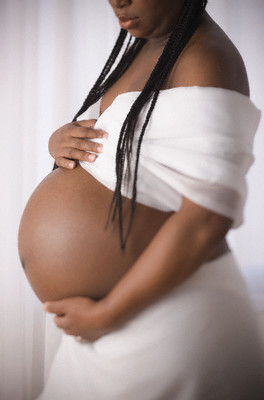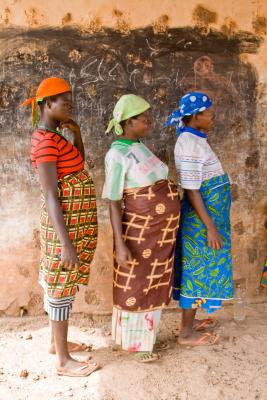 Around the world today, maternal deaths are the biggest killers of women of child-bearing age, 99 percent of which are situated in the developing world. Every year, 529 women perish as a direct result of being pregnant. The irony is that almost all of these deaths could have been prevented through the provision of some of the most basic health care measures.
Around the world today, maternal deaths are the biggest killers of women of child-bearing age, 99 percent of which are situated in the developing world. Every year, 529 women perish as a direct result of being pregnant. The irony is that almost all of these deaths could have been prevented through the provision of some of the most basic health care measures.
It is against this backdrop that Juliet Yaa Asantewaa Asante has embarked on educating women on the need for proper fertility practices. Juliet is founder and Executive Director of Save Our Women International (SOWI), a non-governmental organization which, among other things, focuses on raising public awareness about the dangers of undergoing unsafe abortions and bad health practices that lead to HIV/AIDS contraction. SOWI also helps women get the counseling they need about reproductive health.
Asante, a native of Ghana, has encountered many important issues relating to female fertility health in her West African homeland, which has motivated her to take personal action. She finds this issue vital to the well being of her country and region as a whole. Illegal abortion and poor fertility health kills more than 30% of women of child bearing age in Ghana, according to SOWI.
Asante became aware of the severity of this situation when she was contacted by Marie Stopes International, a non-governmental organization headquartered in London, which was working on a sexual and reproductive health project. Asante assisted them in finding at-risk women who were willing to participate in a BBC documentary on the relevance of Marie Stopes International to the country and region.
"I was asked to aid because of my close connection with women in my country and as a result of works I had done over the years," said Asante. 
Asante says that in Ghana, practices are gruesome. They range from the intake of washing powder and powdered bottles that induce abortion to the sticking of sharp gadgets into private parts in hopes of perforating the fetus and consequently inducing abortion.
For those who have the money, Asante explains that several reasons may account for their reluctance to go to a hospital. Abortion is illegal in Ghana. Also, there is the perceived shame of having an abortion.
"Quack doctors therefore have a field day; leading to poorly done abortions, resulting in infertility and sometimes death. In cases where the victims escape these, psychological trauma is very obvious," said Asante. "Needless to say, the above puts the health of the marriages of many of the victims under continuous threat."
And, for those who decide to carry their pregnancy to full term, they do not have access to proper health care. The doctor to patient ratio in some areas of Ghana ranges from 1 to 100. Indeed, the few who have access to doctors may not be able to afford antenatal drugs or frequent trips to the obstetrician.
Whereas financial restrictions and fear of public ridicule may force women to undergo unsafe abortions, it must also be noted that unavailability of appropriate health facility, lack of information and sensitization of proper female health practice may lead to unsafe abortion.
"Even though there are agencies set up to handle these issues such as the Planned Parenthood Association of Ghana (PPAG), there is still a big gap in the education process as well as a link between women at risk and the help available to them," said Asante. "There is also an overall public unawareness, failure to tackle and a tendency to sweep under the carpet this social menace. In our research, 7 in every 10 women we spoke to had experienced an unwanted pregnancy and almost all of them had undergone or attempted an unsafe abortion."
 Many Ghanaian women who have been victims of unsafe female reproductive procedures have been aided by SOWI. Their last names have not been revealed to protect their identity.
Many Ghanaian women who have been victims of unsafe female reproductive procedures have been aided by SOWI. Their last names have not been revealed to protect their identity.
Asante recalls Rosalina and Akos who underwent unsafe and incomplete abortion procedures which led to infections and near death. For Akos, one of her fallopian tubes got removed completely without her knowledge. She now has difficulty having babies.
In the case of Yaa, her doctor stood on his moral grounds and did not abort the baby. She went ahead with it anyway, then was accused of killing the baby after the fetus was found and shown to her. The emotional trauma still ravages her. Dorothy, the most grave case Asante references, is nearly disabled after undergoing an incomplete abortion procedure.
SOWI contributes to curbing these issues by using powerful visual media such as documentaries that focus on exposing unsafe methods and procedures, true stories and experiences of women, and encouraging the use of contraceptives.
The organization also holds workshops to educate students and organizes forums for women. Staffers counsel pre and post-abortive clients and may also provide financial help for clients to undergo a safe abortion, where a need is established.
Asante believes women, as part of their rights, should be fully educated on all their rights concerning fertility and its consequences. Then they should be given the freedom, as adults, to choose their actions and to take responsibility for them.
As a public speaker and mentor, Juliet has also championed the cause of women entrepreneurship for several years. She is the originator of the SOWI Mentoring Clubs in Ghana and the founder and President of the Eagle Women Empowerment Club (EWEC). Members of EWEC are women committed to contributing to economic growth and reform, and supporting the needs of women-led businesses and professional women in order to make significant social impact.
Quite surprisingly, Asante's social work is not her primary career. She is known continent-wide as a media and entertainment mogul.
She is the Executive Producer of Secrets, an electrifying drama series on Ghana Television, and also hosts, produces and directs Oh Baby, a talk show on relationships. In 2001, Juliet was featured in the HBO film Deadly Voyage, starring Omar Epps, Joss Ackland and Sean Pertwee as well as the acclaimed MNet soap opera, Tinsel. 
She is a member of the Entertainment and the Global Agenda Council of the World Economic Forum and is involved in its global redesign project. Ten years ago, she founded a production house, Eagle Productions Limited, which parents the Eagle Drama College, training many actors and actresses in the African movie industry today. In fact, she has written, produced and directed some of the Ghana's best and longest-running TV programs.

